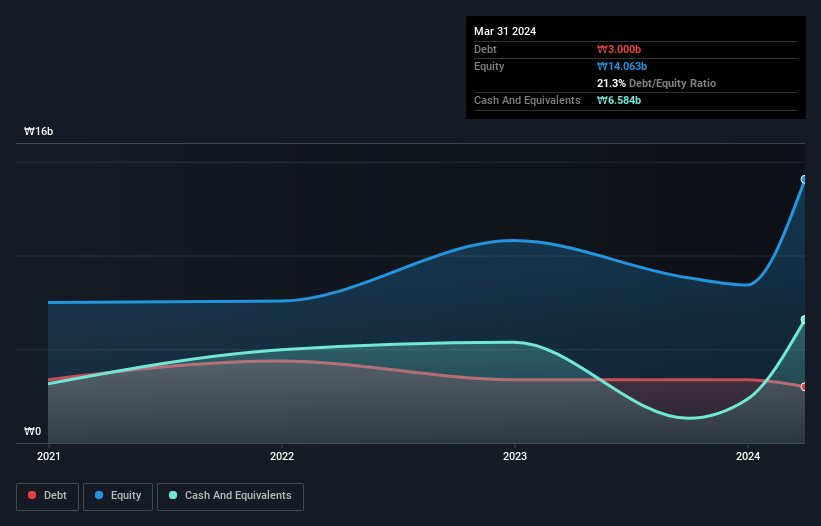- South Korea
- /
- Commercial Services
- /
- KOSDAQ:A068100
Does Kweather (KOSDAQ:068100) Have A Healthy Balance Sheet?
Warren Buffett famously said, 'Volatility is far from synonymous with risk.' When we think about how risky a company is, we always like to look at its use of debt, since debt overload can lead to ruin. We note that Kweather Co., Ltd (KOSDAQ:068100) does have debt on its balance sheet. But the real question is whether this debt is making the company risky.
When Is Debt A Problem?
Debt is a tool to help businesses grow, but if a business is incapable of paying off its lenders, then it exists at their mercy. Part and parcel of capitalism is the process of 'creative destruction' where failed businesses are mercilessly liquidated by their bankers. However, a more common (but still painful) scenario is that it has to raise new equity capital at a low price, thus permanently diluting shareholders. Having said that, the most common situation is where a company manages its debt reasonably well - and to its own advantage. When we think about a company's use of debt, we first look at cash and debt together.
See our latest analysis for Kweather
How Much Debt Does Kweather Carry?
As you can see below, Kweather had ₩3.00b of debt at March 2024, down from ₩3.38b a year prior. However, its balance sheet shows it holds ₩6.58b in cash, so it actually has ₩3.58b net cash.

How Healthy Is Kweather's Balance Sheet?
We can see from the most recent balance sheet that Kweather had liabilities of ₩2.22b falling due within a year, and liabilities of ₩2.99b due beyond that. On the other hand, it had cash of ₩6.58b and ₩2.11b worth of receivables due within a year. So it can boast ₩3.49b more liquid assets than total liabilities.
This surplus suggests that Kweather has a conservative balance sheet, and could probably eliminate its debt without much difficulty. Succinctly put, Kweather boasts net cash, so it's fair to say it does not have a heavy debt load! The balance sheet is clearly the area to focus on when you are analysing debt. But ultimately the future profitability of the business will decide if Kweather can strengthen its balance sheet over time. So if you want to see what the professionals think, you might find this free report on analyst profit forecasts to be interesting.
Over 12 months, Kweather made a loss at the EBIT level, and saw its revenue drop to ₩14b, which is a fall of 15%. That's not what we would hope to see.
So How Risky Is Kweather?
By their very nature companies that are losing money are more risky than those with a long history of profitability. And we do note that Kweather had an earnings before interest and tax (EBIT) loss, over the last year. Indeed, in that time it burnt through ₩4.3b of cash and made a loss of ₩3.4b. However, it has net cash of ₩3.58b, so it has a bit of time before it will need more capital. Even though its balance sheet seems sufficiently liquid, debt always makes us a little nervous if a company doesn't produce free cash flow regularly. When analysing debt levels, the balance sheet is the obvious place to start. But ultimately, every company can contain risks that exist outside of the balance sheet. Be aware that Kweather is showing 3 warning signs in our investment analysis , and 2 of those are significant...
If, after all that, you're more interested in a fast growing company with a rock-solid balance sheet, then check out our list of net cash growth stocks without delay.
Valuation is complex, but we're here to simplify it.
Discover if Kweather might be undervalued or overvalued with our detailed analysis, featuring fair value estimates, potential risks, dividends, insider trades, and its financial condition.
Access Free AnalysisHave feedback on this article? Concerned about the content? Get in touch with us directly. Alternatively, email editorial-team (at) simplywallst.com.
This article by Simply Wall St is general in nature. We provide commentary based on historical data and analyst forecasts only using an unbiased methodology and our articles are not intended to be financial advice. It does not constitute a recommendation to buy or sell any stock, and does not take account of your objectives, or your financial situation. We aim to bring you long-term focused analysis driven by fundamental data. Note that our analysis may not factor in the latest price-sensitive company announcements or qualitative material. Simply Wall St has no position in any stocks mentioned.
About KOSDAQ:A068100
Kweather
Provides weather and related services to mass media, industries, and private and governmental organizations in Korea.
Excellent balance sheet with very low risk.
Market Insights
Community Narratives



